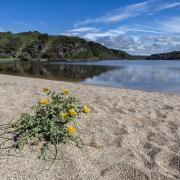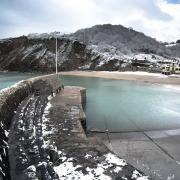Cornish gardens come in all shapes, colours and sizes and now there is the potager near Falmouth

A potager is defined as a homespun space and at Constantine, Potager Garden is divided into rooms to give it an even more domestic feel, writes Louise Danks...
From railway carriage building in North Wales to boat building in Falmouth and then to renting a workshop at Potager in Highcross, near Constantine Falmouth, Mark Harris fell in love with this space in 2006, went into partnership with the then owners and set to work creating the garden that exists today.
I remember heading out into the head-high bracken and brambles with a strimmer and quickly returning thinking “This is hopeless!” and then going back out with a scythe and again thinking “This is hopeless”, eventually we bought a tractor on ebay and began to make progress in taming the wilderness,’ says Mark.
Mark and his partner Saffa are very clear about the ethos of this garden. We use organic gardening techniques but on a domestic scale. The site itself is very small and further subdivided into rooms inspired by domestic settings, making it easy for visitors to relate to the space and give them ideas to take home,’ explains Mark. The potager’s environmental credentials apply not only to the food prepared and served in the café but also to the organic methods used throughout the garden and are part of its success - and what makes it different to many others.

I know that it works when I see someone having breakfast at 10am and then walk past them in a deckchair on the lawn at five in the afternoon; I want it to always feel like a space where people can come to relax and unwind.’
With no paid gardeners here, the dedicated volunteers work hard with Mark and Saffa to maintain and develop the garden; driving it forward, keeping it fresh and enticing, and ensuring the plant sales are well stocked by propagating and then growing on the young plants that originate from the garden.
Reclaimed sleepers edge the borders and provide height, boundaries and definition throughout the garden, they are a subtle contrast to the choice of aggregate used. Planting in the gravel where it acts as both path and border mulch gives a sense of freedom and the feeling of being unconstrained, being given permission to wander.
Using a restrained palette of materials along with a little imagination in a number of different ways can be incredibly effective The simple duo of gravel and recycled wood do not compete with the planting, yet still add a level of interest in a small space.

Extending the season of interest into the autumn and beyond tends to rely on shape, texture and form rather than the heady days of pure blooming colour. The spires of Macleaya cordata, the pale-pink, open faces of the Anemone japonica planted in drifts, the nodding, weighty seed heads of Verbena bonariensis and clusters of fat seed pods belonging to the once majestic agapanthus is a different dimension of a garden.
The fruit trees, bushes, salad and vegetables which help to supplement the menu in the glasshouse café – locally produced, organic produce being a staple on the menu, take their place in the garden alongside the still lush, packed ornamental herbaceous borders where semi-evergreen perennials hold onto their foliage in the quiet shelter of Potager.
Hedges are clipped neatly for dynamism and evergreen form, yew, box, bay and even a low-level sage hedge for an unexpected twist on the usual lavender or rosemary but equally as valuable in terms of foliage interest, longevity and flowering period. They create shelter, privacy and jeopardy in a small garden like this, limiting the view and revealing at just the right moment.
Even now there are the last of the summer blooms holding on until the first frosts, those touches of warmth in the final nasturtiums and the odd, brave daylily. The rainiest October days have something to offer at Potager, the large original greenhouse is planted with a grape vine and other mature specimens that need frost protection or just much drier Mediterranean type conditions; the more delicate lavenders, scented-leaved geraniums and an enormous sparmannia thrive, it’s also home to a ping pong table and a range of seating – perfect to sit and read or just to absorb the unique atmosphere that is often commented upon.
There will be plenty of activity outside too; We will be harvesting the apples from what is a petty ramshackle orchard. The trees are the last remaining vestige of nursery stock that was to be sold but took root through their pots. We now use the apples in the café.’
We’ll also be mulching beds and revisiting some of the areas in the garden that need work; refreshing planting as and where necessary. Over the last few years, rebuilding the glasshouse which is home to the café and increasing the size of the carpark are two projects that have taken time and effort, now it’s the turn of the garden. It is important that it doesn’t become tired it is the heart of everything and what draws people here. We’re seeing it as a period of consolidation if you like.’
Those who know about Potager Garden are torn between wanting to tell everyone about this magical place and keeping a secret in order to make sure it doesn’t change. Mark feels the same. Our aim is for Potager to become financially and environmentally sustainable but I don’t want to lose what we have and become too busy. It’s all about finding a balance and keeping Potager an enjoyable place to visit and for us to work.’
Mark describes the Potager as homespun and although this is part of its charm and the reason why people are so delighted to discover it and to return. But make no mistake; charming and homespun it maybe, twee it is not, there is a sophisticated edge to the planting, to the materials used in the hard landscaping, they are considered and clean. It is a garden with a conscience without being worthy, it is relaxed and completely individual.
Contact
Potager Garden and Greenhouse Café
Highcross
Constantine
Falmouth
TR11 5RF
01326 341258
Open Friday, Saturday, Sunday and Bank Holiday Mondays 10am – 5pm





























